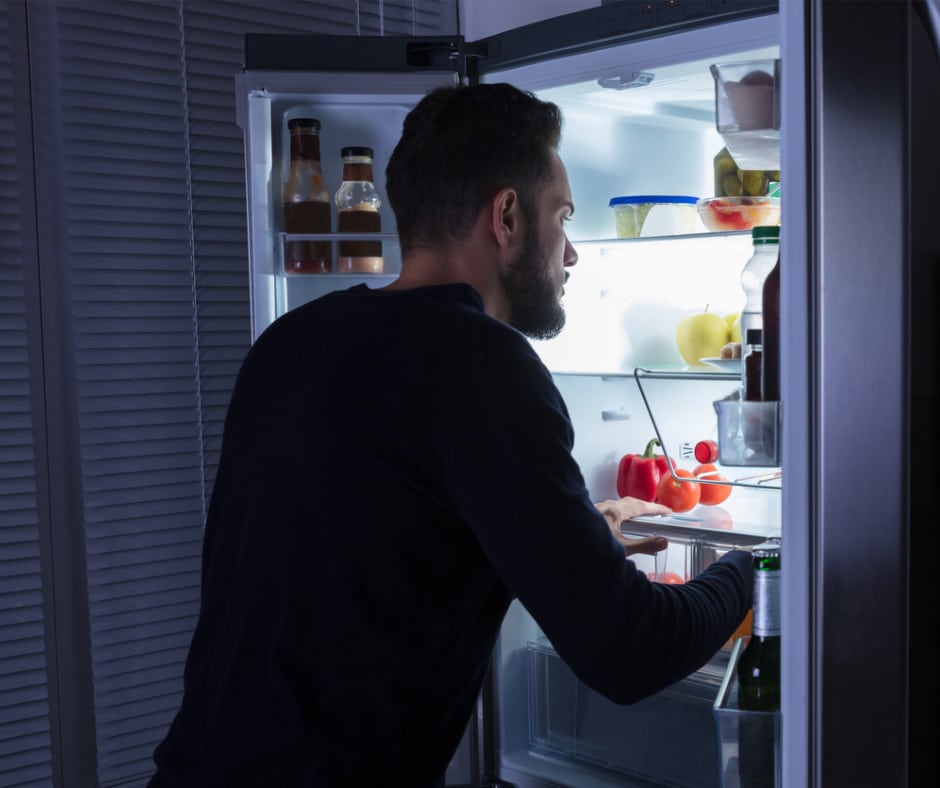When the sun goes down, so does your dieting willpower.
That’s the finding of a study that shows you’re most likely to overeat at night—especially if you’re feeling stressed.
The research focused on two hormones that affect appetite: ghrelin and peptide YY.
They are the yin and yang of hunger. Ghrelin makes you feel hungry. Peptide YY makes you feel full.
Scientists at the Johns Hopkins School of Medicine and the Mount Sinai Icahn School of Medicine wanted to find out what time of day each of these hormones had the most control over eating habits.
The researchers gathered 32 overweight people. They ranged in age from 18 to 50. Many of them reported having problems with food cravings. Half were previously diagnosed with binge-eating disorder.[1]
Each subject participated in two experiments. The first required them to fast for eight hours overnight and then drink a 608-calorie liquid meal at 9 a.m.
For the second experiment, the participants fasted during the day for eight hours. And they consumed the identical 608-calorie liquid meal at 4 p.m.
Two hours after each meal, participants were “stressed” by plunging one hand in a bucket of 34-degree water for two minutes. A half hour later, they were offered an enticing buffet that included pizza, cookies, chips, and candy.[2]
The researchers took blood samples from the subjects periodically during the experiments to monitor their levels of ghrelin and peptide YY. Subjects also self-reported their feelings of hunger and fullness.
Food Cravings Peak at Night
The researchers found that no matter if subjects fasted at night or during the day, they experienced a gradual increase in the hunger hormone ghrelin during the day until it peaked in the evening. And conversely, the fullness hormone peptide YY fell during day and reached minimum levels in the evening.
The stress test pushed ghrelin levels even higher, but only in the evening, the study found.
When confronted with the buffet in the evening, subjects “reported greater loss of control and binge resemblance,” researchers said.
Professor Susan Carnell of Johns Hopkins led the study. She said the research shows that the “evening is a high-risk time for overeating, especially if you’re stressed and already prone to binge eating.
“The good news is that having this knowledge, people could take steps to reduce their risk of overeating by eating earlier in the day, or finding alternative ways to deal with stress.
The study recently was published in the International Journal of Obesity.[3]
4 Ways to Stop Nighttime Food Cravings
You can lessen the impact of hormonal influences on hunger by following these strategies:
1.) Include protein in your evening meal. Studies have shown that protein keeps you fuller longer.[4]
One study found that when people increased their protein intake by 15-30%, they reported a marked decrease in hunger. And they automatically lowered their calorie intake by almost 500 calories a day.
Grass-fed beef, wild-caught fish, free-range chicken, and organic eggs are great sources of protein.
2.) Make sure your evening meal contains fiber. Dietary fiber takes hours to digest and prolongs feelings of fullness.
Fiber causes a bulking effect in your digestive tract that keeps away hunger. Artichokes, peas, broccoli, avocados, raspberries, pears, and raw almonds all contain good amounts of fiber.
Flaxseed is a great way to add fiber to your food. Add it to salads, steamed veggies, smoothies, broiled fish, or soups. Be sure to use ground flaxseed, not whole. This form is easier to digest.
3.) Drink water. If you feel evening hunger setting in, try drinking a glass of water. Hunger is often a sign of dehydration rather than the need for food. And one or two glasses of water will help reduce hunger pangs by filling your stomach with fluid.[5]
4.) End evening stress. Stress is one of the most common reasons people eat at night. But there is a simple and quick way to reduce it. A Georgetown University study found that mindful meditation—even just for five minutes—can reduce stress. Click here for a step-by-step guide on how to do it.
Don’t let nighttime food binges sabotage your waistline. Use the techniques above to keep hunger at bay after the sun goes down.
Editor’s Note: Have you gained weight during the pandemic? You’re not alone. Americans have packed on an average of two pounds a month during the coronavirus crisis, according to a recently study.
Read our monthly journal Independent Healing to discover how to lose pandemic pounds without going hungry or giving up your favorite foods. Go HERE to find out more.
Related Articles
The ‘Secret Sauce’ That Helps You Lose Weight
The Simple Eating Trick for Weight Loss Success
The Surprising Reason You Can’t Lose Weight
References:
[1] https://consumer.healthday.com/mental-health-information-25/behavior-health-news-56/why-evenings-may-be-a-dangerous-time-for-dieters-730237.html
[2] https://www.mdlinx.com/pharmacy/?article_alert=7500805
[3] https://www.nature.com/articles/ijo2017307
[4] https://www.healthline.com/nutrition/10-ways-to-stop-eating-late-at-night
[5] http://healthyeating.sfgate.com/tips-squelch-hunger-evening-2737.html

